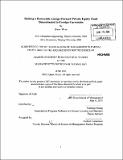| dc.contributor.advisor | Yasheng Huang. | en_US |
| dc.contributor.author | Miao, Quan, S.M. Massachusetts Institute of Technology | en_US |
| dc.contributor.other | Sloan School of Management. | en_US |
| dc.coverage.spatial | a-cc--- | en_US |
| dc.date.accessioned | 2011-09-13T17:56:05Z | |
| dc.date.available | 2011-09-13T17:56:05Z | |
| dc.date.copyright | 2011 | en_US |
| dc.date.issued | 2011 | en_US |
| dc.identifier.uri | http://hdl.handle.net/1721.1/65813 | |
| dc.description | Thesis (S.M.)--Massachusetts Institute of Technology, Sloan School of Management, 2011. | en_US |
| dc.description | Cataloged from PDF version of thesis. | en_US |
| dc.description | Includes bibliographical references (p. 74-75). | en_US |
| dc.description.abstract | China's private equity industry has seen rapid growth during the past decade. Private equity funds focused on different sectors and stages and denominated in different currencies are competing for limited investment opportunities. To succeed in the ultracompetitive environment, private equity firms need to demonstrate the ability to raise new funds and generate satisfactory returns for their investors in the long term. Bohai Industrial Investment Fund Management Co., Ltd ("BIIFM") is one of China's earliest and largest private equity fund manager of RMB-denominated funds and currently manages an RMB6.08 billion (US$900 million) fund. Now in its fourth year of the five-year investment period, BIIFM is in the position to raise a new fund as its first fund will soon be substantially invested. BIIFM, however, is faced with different options in determining the specific type of fund to raise. The new fund can be an RMBdenominated one, like the first fund, or a U.S. dollar-denominated one. It can be a generalist fund, investing across sectors, or a sector-specific one. For BIlFM to have a competitive edge in this ever more competitive industry, a well-planned fundraising strategy is essential. Based on my observations of the recent development in China's private equity industry, I believe that developing expertise in certain areas will help a fund distinguish itself from competitors. Meanwhile, raising a U.S. dollar-denominated fund will give BIIFM additional flexibility in investment and complement its current RMB fund. Therefore, in this thesis I propose a plan for BIIFM to raise a U.S. dollar-denominated fund focusing on the energy sector, especially the renewable energy area. To this end, I discuss opportunities in China's private equity industry, best practices for raising and managing parallel funds in China, the rationales for BIIFM to raise this new fund, specific proposal for this fund, as well as investment opportunities in the renewable energy sector. | en_US |
| dc.description.statementofresponsibility | by Quan Miao. | en_US |
| dc.format.extent | 75 p. | en_US |
| dc.language.iso | eng | en_US |
| dc.publisher | Massachusetts Institute of Technology | en_US |
| dc.rights | M.I.T. theses are protected by
copyright. They may be viewed from this source for any purpose, but
reproduction or distribution in any format is prohibited without written
permission. See provided URL for inquiries about permission. | en_US |
| dc.rights.uri | http://dspace.mit.edu/handle/1721.1/7582 | en_US |
| dc.subject | Sloan School of Management. | en_US |
| dc.title | Raising a renewable energy-focused private equity fund denominated in foreign currencies | en_US |
| dc.title.alternative | Raising an energy-focused private equity fund denominated in foreign currencies | en_US |
| dc.type | Thesis | en_US |
| dc.description.degree | S.M. | en_US |
| dc.contributor.department | Sloan School of Management | |
| dc.identifier.oclc | 750527370 | en_US |
